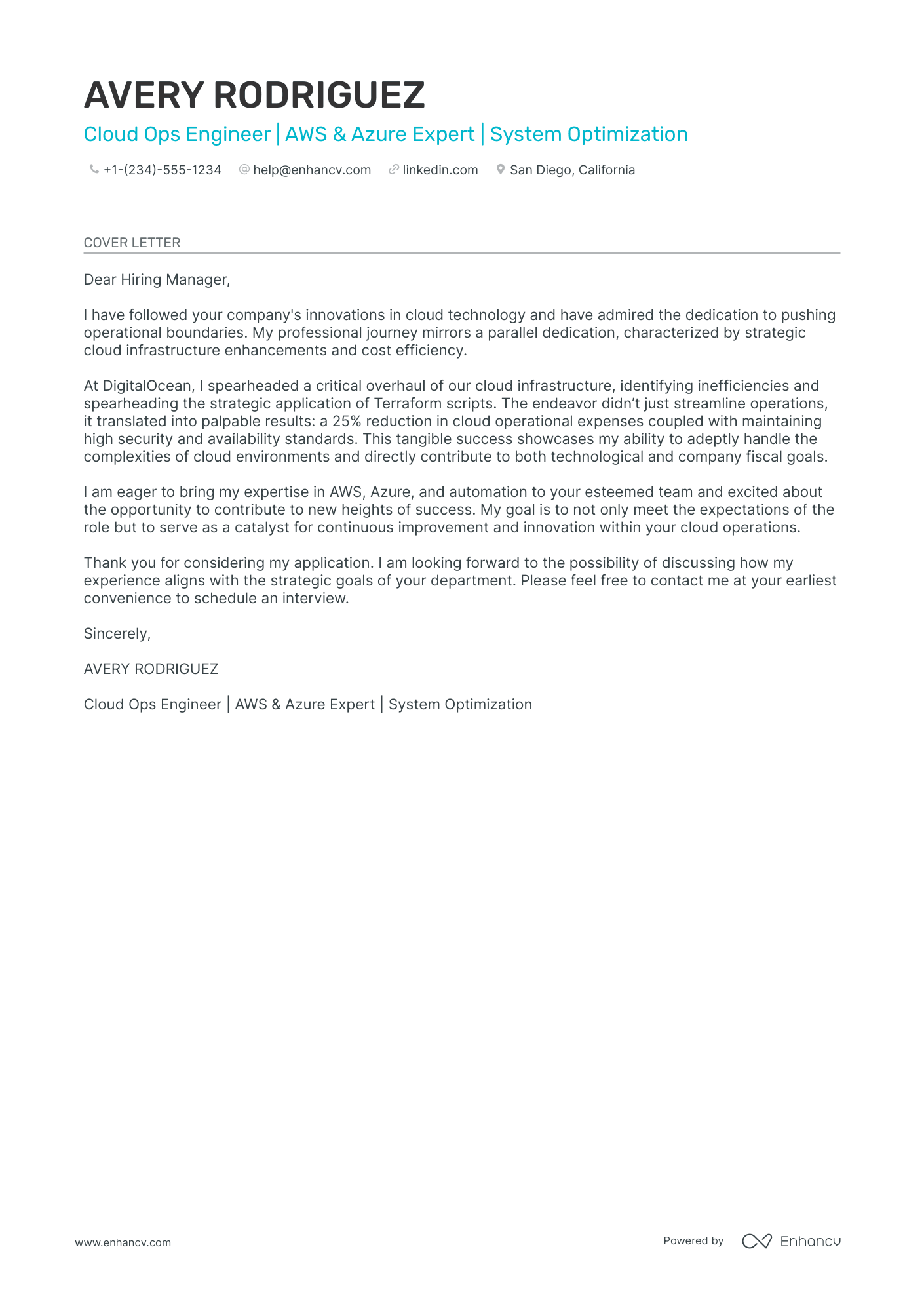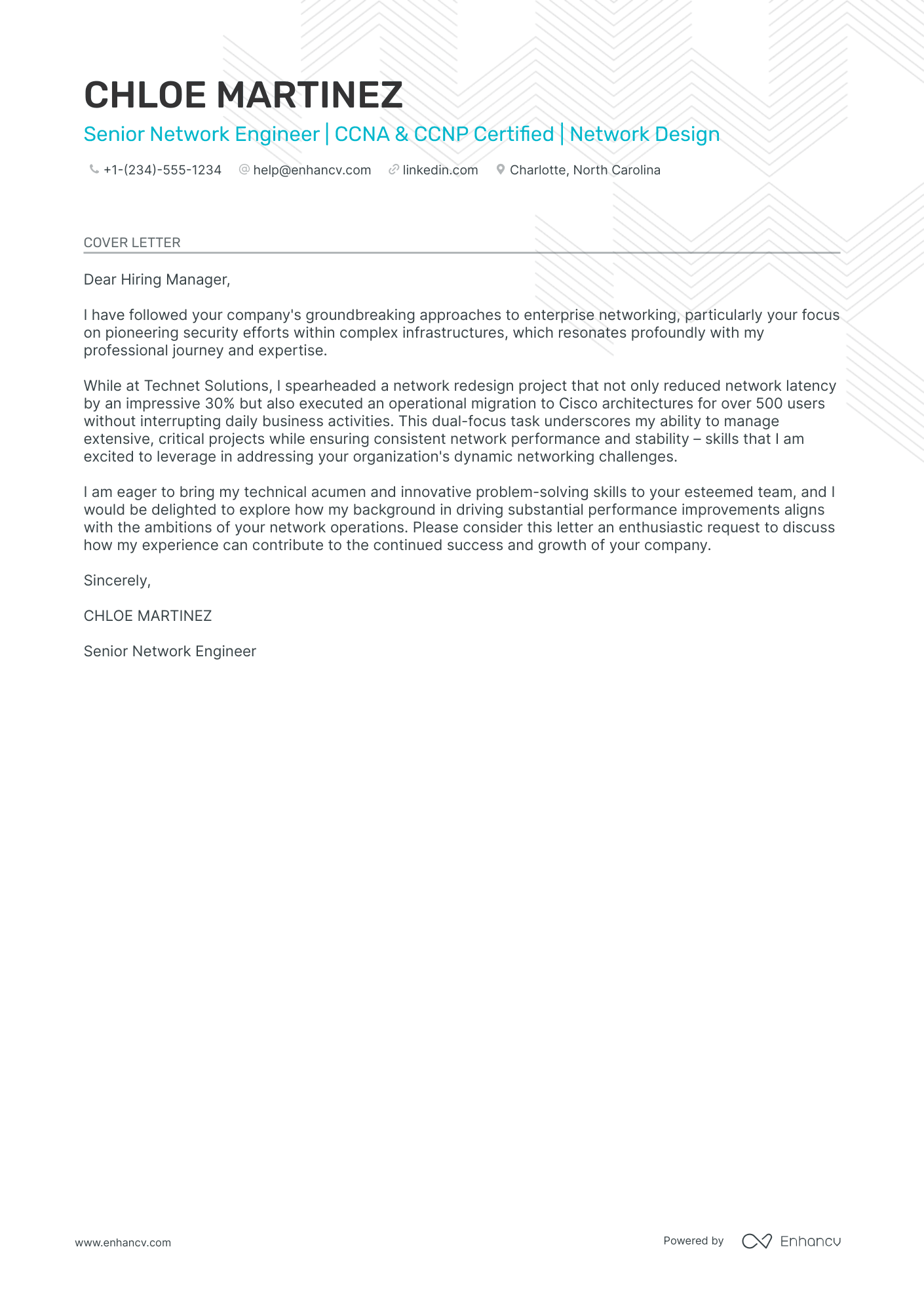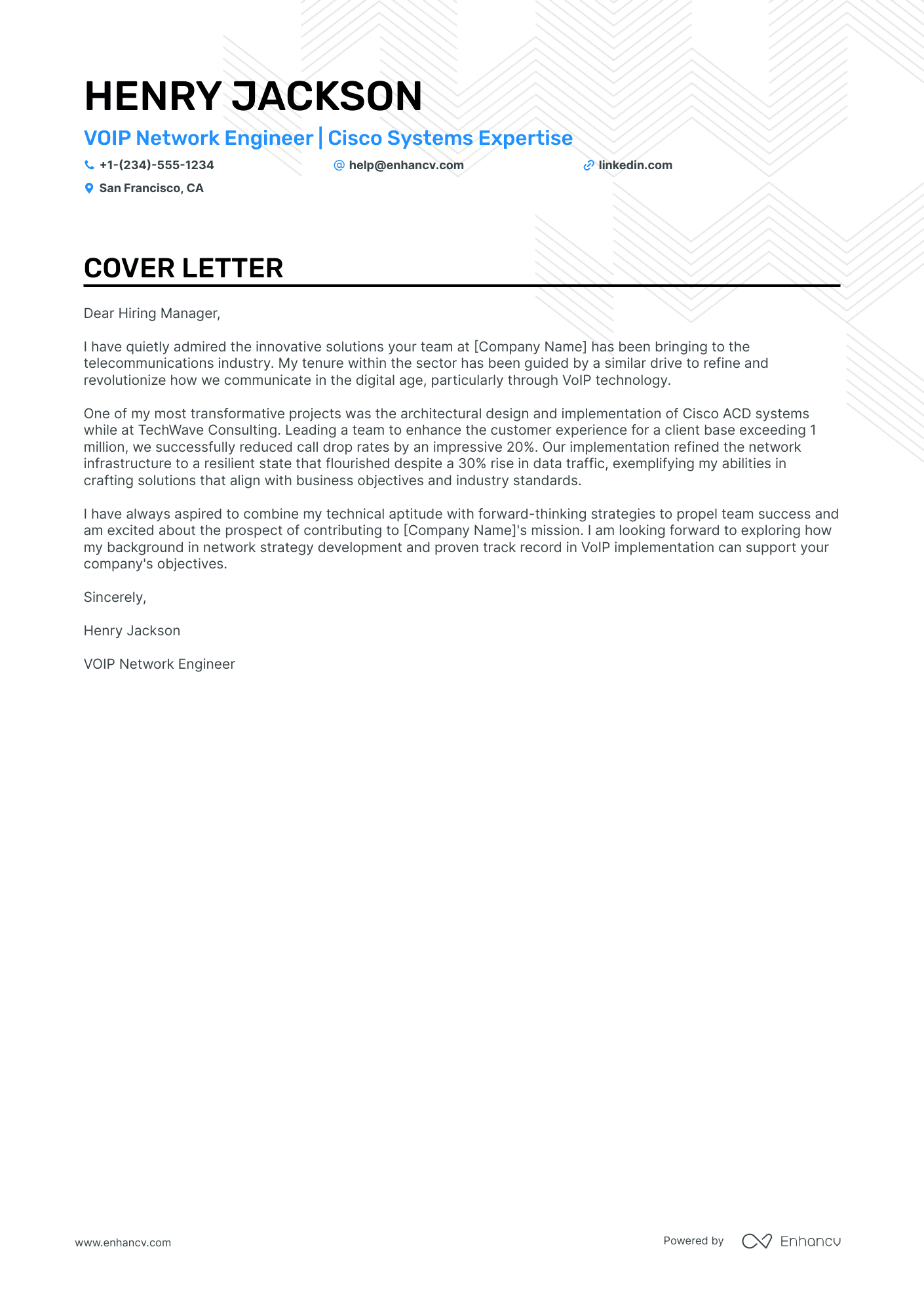Crafting a network engineer cover letter can be a stumbling block even after breezing through job listings. You understand it's more than a resume echo; it's your stage to spotlight a triumph that makes you proud. But how do you weave your narrative formally without falling into clichés, all in a concise one-page pitch? Here, we'll demystify the process, ensuring your cover letter reflects your unique professional story—distinctly and effectively.
- Create a network engineer cover letter to persuade the recruiters you're the best candidate for the role;
- Use industry-leading network engineer cover letter templates and examples to save time;
- Dedicate your network engineer cover letter space to your best achievement;
- Make sure your network engineer cover letter meets recruiters' expectations and standards.
Avoid starting at the blank page for hours by using Enhancv's AI - just upload your resume and your network engineer cover letter will be ready for you to (tweak and) submit for your dream job.
If the network engineer isn't exactly the one you're looking for we have a plethora of cover letter examples for jobs like this one:
Drop your resume here or choose a file.
PDF & DOCX only. Max 2MB file size.
Network engineer cover letter example
PETER CONNOLLY
New York City, NY
+1-(234)-555-1234
help@enhancv.com
- Emphasizing relevant experience: The cover letter highlights the candidate's firsthand experience with network redesign and upgrades, which is key for a Network Engineer role, demonstrating practical skill applications that directly relate to the job.
- Quantifiable achievements: Including specific metrics, such as a 30% increase in network reliability, showcases the candidate's impact in their previous position, making the application more compelling and credible.
- Alignment with company values: Signaling awareness of the company's commitment to innovation and security suggests that the candidate has done their research and understands the employer's needs and culture.
- Demonstrating soft skills: By mentioning commendations from top management, the candidate implies strong communication skills and the ability to collaborate and be recognized within a corporate structure.
Structuring and formatting your network engineer cover letter
Here's what the structure of your network engineer cover letter should include:
- Header (with your name, the position you're applying for, and the date);
- Salutation (or greeting);
- Introductory paragraph (or your opening statement);
- Body paragraph (or further proof of your experience);
- Closing paragraph (with a call to action);
- Signature (that is optional).
Use the same font for your network engineer resume and cover letter - modern fonts like Lato and Rubik would help you stand out.
Your network engineer cover letter should be single-spaced and have a one-inch margins - this format is automatically set up in our cover letter templates and our cover letter builder.
When submitting your cover letter, always ensure it's in PDF, as this format keeps the information intact (and the quality of your document stays the same).
On one final note - the Applicant Tracker System (ATS or the software that is sometimes used to initially assess your application) won't read your network engineer cover letter.
Writing cover letters just got easier. Use our free cover letter generator to create yours instantly.
The top sections on a network engineer cover letter
Header: This includes your contact information, the date, and the recipient's details. It is essential as it allows the recruiter to quickly know who you are and how to contact you, as well as personalizing the cover letter to the specific job and company.
Opening Greeting: Address the recruiter or hiring manager by name if possible. Personalization is key in making an initial connection and shows that you have put time into researching who will be receiving and reading your cover letter.
Introduction: Briefly introduce yourself as a network engineer and include a hook, like a major accomplishment or a unique skill set, that aligns with the job requirements. It sets the stage for the letter and grabs the recruiter's attention.
Technical Expertise and Experience Section: Highlight specific network engineering skills like familiarity with certain protocols, network analysis, and troubleshooting abilities, as well as relevant certifications (e.g., CCNA, CCNP) and experience. Recruiters look for this to quickly assess your technical suitability for the role.
Closing and Call to Action: Politely conclude by reiterating your interest in the role and suggesting a follow-up action, such as a meeting or phone call. A strong closing can leave a lasting impression, which is vital in a competitive job market.
Key qualities recruiters search for in a candidate’s cover letter
- In-depth understanding of network infrastructure: Recruiters look for candidates who have a solid grasp of network hardware, software, and protocols, as well as experience with network design and implementation.
- Certifications in networking technologies: Holding professional certifications such as CCNA, CCNP, or JNCIA indicates a commitment to the field and a standardized level of expertise that is highly valued.
- Troubleshooting and analytical skills: The ability to diagnose and resolve network issues quickly is critical, so recruiters seek individuals with a proven record of troubleshooting complex network problems.
- Experience with network security: Knowledge of firewalls, VPNs, IDS/IPS, and network access controls is important to protect the organization's data and maintain compliance with security standards.
- Proficiency in network management software: Familiarity with tools used for network monitoring, management, and configuration, like SolarWinds, Nagios, or Cisco Prime, demonstrates practical skills that enable efficient network operations.
- Communication and documentation abilities: Effectively communicating technical information to non-technical stakeholders and creating clear documentation is essential for the coordination of network projects and the maintenance of network infrastructure.
Personalizing your network engineer cover letter salutation
Always aim to address the recruiter from the get-go of your network engineer cover letter.
Use:
- the friendly tone (e.g. "Dear Paul" or "Dear Caroline") - if you've previously chatted up with them on social media and are on a first-name basis;
- the formal tone (e.g. "Dear Ms. Gibbs" or "Dear Ms. Swift") - if you haven't had any previous conversation with them and have discovered the name of the recruiter on LinkedIn or the company website;
- the polite tone (e.g. "Dear Hiring Manager" or "Dear HR Team") - at all costs aim to avoid the "To whom it may concern" or "Dear Sir/Madam", as both greetings are very old-school and vague.
List of salutations you can use
- Dear Hiring Manager,
- Dear [Company Name] Team,
- Dear [Department Name] Hiring Committee,
- Dear [Specific Hiring Manager's Name if known],
- Attention: [Hiring Manager or Department Title],
- Esteemed Recruitment Panel,
Using your network engineer cover letter intro to show your dedication
We know just how difficult it is to start writing your network engineer cover letter introduction.
There are so many great qualities you have as a professional, which one should you choose?
How about writing up to two sentences about your passion and commitment to the work you do or are set to do?
Try to describe exactly what you enjoy about the potential role.
A positive attitude from the get-go will help you stand out as a motivated network engineer professional.
What to write in the middle or body of your network engineer cover letter
Here's where it gets tricky.
Your network engineer cover letter body should present you in the best light possible and, at the same time, differ from your resume.
Don't be stuck in making up new things or copy-pasting from your resume. Instead, select just one achievement from your experience.
Use it to succinctly tell a story of the job-crucial skills and knowledge this taught you.
Your network engineer cover letter is the magic card you need to further show how any organization or team would benefit from working with you.
Two ideas on how to end the final paragraph of your network engineer cover letter
Closing your network engineer cover letter, you want to leave a memorable impression on recruiters, that you're a responsible professional.
End your cover letter with how you envision your growth, as part of the company. Make realistic promises on what you plan to achieve, potentially, in the next six months to a year.
Before your signature, you could also signal hiring managers that you're available for the next steps. Or, a follow-up call, during which you could further clarify your experience or professional value.
Lacking experience: here's how to write your network engineer cover letter
As a candidate with no experience, it's important to be honest from the get-go of your application.
Use your network engineer cover letter to sell your unique talents. Choose an accomplishment from your academic background or your volunteer work to show the skills that are relevant to the role.
Focus on your career objectives and how you see the job to align with them. Be specific and, at the same time, realistic about where you picture yourself in five years.
Key takeaways
Your network engineer cover letter is your best shot at standing out by showing your motivation and the unique skills you'd bring to the job:
- Chose no more than one achievement, which you'd be talking about in the body of your network engineer cover letter, by focusing on skills and outcomes;
- Address recruiters with their first or last name, or "Dear Hiring Manager" in your network engineer cover letter greeting;
- Introduce in no more than two sentences what makes your profile unique (perhaps it's your motivation, enthusiasm, or appreciation of the company you're applying for);
- Select the same font you have used in your resume (avoid Times New Roman and Arial, as most candidates tend to invest in them);
- Close your network engineer cover letter with a promise of how you see yourself growing in the company and the benefits you'd bring about.
Network Engineer cover letter examples
By Role








